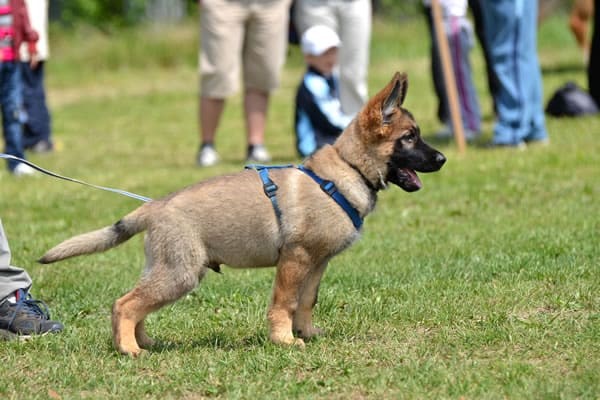German Shepherd Dogs are renowned for their exceptional loyalty, fidelity, and ability to excel in training. They often serve as police security (guard) dogs and as service dogs, known for their friendly and devoted nature towards their owners and their relatives.
Training your German Shepherd puppy demands time, patience, commitment, and a structured approach to ensure a well-behaved dog.
Initiating training for your German Shepherd puppy should occur as soon as it becomes a part of your household. German Shepherds possess strong loyalty and strength, but without proper structure and training, they may develop aggressive behaviors.
For young pups, training sessions should be kept brief, lasting between five to 10 minutes each time. During these sessions, focus on teaching one basic command per session. Attempting longer or more complex training sessions can lead to frustration and failure for both you and your pup.
German Shepherd Puppy Training Tips for Beginners
Building a puppy house can be a laborious task, requiring considerable patience and perseverance, but the rewards for you, your pet, and your family are substantial.
- Always be kind and gentle with your puppy when they approach you.
- Use a soft and normal tone when giving commands, considering that your dog’s hearing is highly acute.
- Consistency in your actions and expectations is key. Spend quality time with your dog and ensure they get daily exercise.
- Teaching puppies to control their biting is crucial, and it’s best to start this training at an early age.
- Maintain a strict feeding schedule for your pup.
- Establish a regular outdoor routine, including walks and bathroom breaks, starting in the morning and continuing every 30 minutes to an hour throughout the day, as well as after meals, naps, and before bedtime.
- When you have a German Shepherd Dog (GSD) at home, it’s important to prevent them from chewing on furniture and toys. Proper obedience training can help create a harmonious living environment.
Socializing your puppy
Teaching your GSD to be obedient to you and to follow your commands is not an easy task. This type of training requires a lot of patience and perseverance. If you somehow lose your temper, both you and your dog will have a hard time.
The socialization of the GSD with the people around it and other animals is an important part of its training. When you get GSD, you need to be comfortable around others so that it doesn’t cause problems in the future.
The German Shepherd is a social animal: avoid isolating it.

- Puppies pull when they run. Our job is to change that natural nature and teach them to walk well on the leash. It takes time, but patience and practice will definitely do the trick.
- Establish a perfect meal schedule. An irregular feeding schedule can affect your dog’s digestive system, eventually leading to chronic digestive disorders.
- Keep food and water bowls (in steel bowls) in one place each day. Set a rule of time to eat. After the time has elapsed, discard the uneaten food and wash the bowl.
- Do not over-treat or over-feed your dog. Too many sweets can lead to unhealthy extra pounds. Many vitamins can also cause unintended consequences.
- Dogs should not be disturbed when they eat. Feed your dog in an area where children and other pets will not bother him. Teach him to be alone when eating or chewing a bone.
- Combine verbal command with hand gesture to reinforce action presented, followed by clicker, clapping, and food treat when successful.
- Puppies are easily excited and have a lot of energy, so it is important that they learn good manners and discipline in their lives.
- Teaching your dog the words “no” or “stop” will help them understand when they are doing inappropriate things at home or around other people and pets.
- Other important commands to teach at the beginning are: sit (sit), stay (stay) and lie down (lie down). When teaching your dog these words, remember to use one command each time, such as “sit,” until the pup completes the task.
Use treats and thank your puppy for obeying your commands during German Shepherd training.
Don’t make your pup overly reliant on treats, as he only follows the instructions on the treat.
In order for your GSD to learn to behave in real situations, you need to introduce distractions between training.
This will help you to know how trained your dog is and to avoid distractions when commanding him to stay, stop, etc.
It is natural for dogs to bark. They alert their family that someone is approaching. You can’t expect a puppy to never bark.
Train him to stop barking after you identify the problem and take responsibility.
Obedience training should begin at 8 weeks of age. You must define your dog’s role in the family.
Be sure not to drag out the training session as this can frustrate the dog. Teach him to be obedient, patient and calm.


